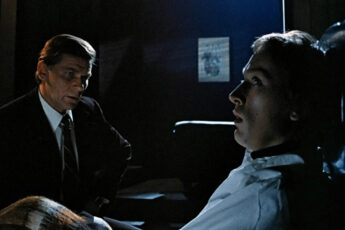
Adrift in the aftermath of a vitriolic divorce, ophthalmologist Pia (Ingrid Isotamm) is struggling to adjust to her new solitary life. Her dreams of motherhood have been twice shattered, first by the separation and second, most damningly, by her own infertility, while her ex-husband is now expecting a child with his new partner. She feels uncomfortable in her new apartment, and even has the sensation that someone is entering her room at night.
Little by little, she makes her new home livable and attempts to re-establish some sense of independence, including by bringing a man back from a night club. However, at the last moment, she pushes him away violently, as if overcome by supernatural strength. In addition, the other relationships in her life develop in unexpected ways. Her best friend Ida (Eva Eensaar-Tootsen) leaves her five-year-old son Peetrike (Rasmus Kallas) with her as she dramatically departs to India to reconcile her own marriage. Rejected by their mother (Epp Eespäev), her younger sister Kaia (Adele Taska) moves in to help with babysitting duties, while an attempted rape in a bar brings her closer to the swarthy owner Kaarel (Johann Urb), who starts taking care of her out of a sense of responsibility. Meanwhile, the apparent night visitations continue, and when she finds out that she is pregnant, despite not having had sex with anyone, Pia can’t help but wonder whether the father is some kind of malevolent or benevolent spirit watching over her.
Slickly made and carefully poised between psychological thriller and horror film, Fire Lily offers viewers the choice of accepting the story at face value as a genre piece or interpreting it as an allegorical exploration of female desire in the broadest sense. In either case, a certain degree of suspension of disbelief is required. While the demonic visitations are intrinsic to the whole premise of the film, the numerous coincidences and overly neat parallels do distract from the otherwise engaging narrative developments. For example, Ida’s casual abandonment of her son seems convenient for the plot rather than genuinely convincing. Likewise, the film could stand to lose one or two of the male characters who serve as red-herrings in the question of the baby’s mysterious paternity. However, these issues are reasonably offset by a masterful handling of mood and tension that sustains interest until the end.
In particular, Fire Lily stands out for the way it depicts Pia at the center of a variety of atypical and constantly shifting relationships. The caricatured figure of her mother brazenly boasts about how she only had children because of the non-availability of contraception at the time, and unmaternally plots to foist her youngest daughter out of the house to make more room for her lover. Nevertheless, despite her obvious shortcomings as a parent and role model, there is still an apparent degree of complex tenderness and mutual dependency between mother and daughter. Similarly, the film wisely subverts the introduction of Kaarel as a potential savior and paternal candidate by refusing to follow the obvious path of a banal romantic sub-plot, instead introducing a connection that is less straightforward and somehow more tender.
Of course, the core of the heart of the film hinges on the interpretation of the nocturnal apparitions. On the level of mise-en-scène, they are presented as factual occurrences. Though the presence of the demon is largely conjured up through the suggestion of unexplained noises and rustlings, we also see Pia’s blankets eerily and unmistakably pulled off her body as she sleeps. This leaves three options – the demon/father is real, the demon is actually a flesh and blood man, and the demon has been constructed by Pia’s subconscious to amend an unsatisfying reality. The film tries to maintain all three alternatives as equally viable, although the second clearly has the fewest interesting implications in terms of both plot and mystique, whereas the latter opens up a far richer array of possibilities and nuance.
If, indeed, Pia has consciously or unconsciously chosen to reject the actual father, it poses the question of how her altered reality is an improvement over the biology or social fact. Is this an act of denial or of agency? By dematerializing the paternal figure, is she regaining control of her own body and determining her own concept of motherhood, on her own terms? Indeed, this ambiguity is enhanced by the moments in which Pia appears to exert a kind of supernatural strength against the men who encroach her intimate space, which could equally be ascribed to the demonic spirit or to a previously dormant force within Pia herself. This same debate can also be extended to the unresolved mystery of why her body suddenly became fertile, and to what extent she was aware of or complicit in this transformation.
Overall, the film toys with these questions at a very surface level, but on the other hand it never makes any pretense of striving for particular depth. Ultimately, it leaves viewers with plenty of poignant images and moments to ponder, even after leaving the cinema, yet it more than adequately serves its purpose as straightforward entertainment.




Leave a Comment